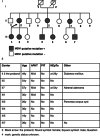A new double substitution mutation in the MEN1 gene: a limited penetrance and a specific phenotype
- PMID: 23188049
- PMCID: PMC3658184
- DOI: 10.1038/ejhg.2012.241
A new double substitution mutation in the MEN1 gene: a limited penetrance and a specific phenotype
Abstract
Multiple endocrine neoplasia type 1 (MEN1) is an autosomal-dominant cancer syndrome that is caused by a germline mutation in the MEN1 gene encoding a tumour-suppressor protein, menin. MEN1 causes a combination of endocrine tumours such as parathyroid adenomas, pituitary adenomas, glucagonomas, gastrinomas, insulinomas, adrenocortical adenomas and non-endocrine tumours. We here present a large MEN1 family where the carriers developed mild hyperparathyroidism, multiple well-differentiated functionally active neuroendocrine tumours of the pancreas and no pituitary tumour. The causal mutation is a new double substitution in the coding region of exon 2 in the MEN1 gene c.[428T>A; 429C>T], p.Leu143His. This new mutation in the MEN1 gene is clinically relevant leading to a limited penetrance and specific phenotype.
Figures
Similar articles
-
A new mutation in the menin gene causes the multiple endocrine neoplasia type 1 syndrome with adrenocortical carcinoma.Endocrine. 2011 Apr;39(2):153-9. doi: 10.1007/s12020-010-9424-3. Epub 2010 Nov 11. Endocrine. 2011. PMID: 21069576
-
A Novel Germline c.1267T>A MEN1 Mutation in MEN1 Family-from Phenotype to Gene and Back.Genes (Basel). 2020 Nov 21;11(11):1382. doi: 10.3390/genes11111382. Genes (Basel). 2020. PMID: 33233395 Free PMC article.
-
Germ-line mutation analysis in patients with multiple endocrine neoplasia type 1 and related disorders.Am J Hum Genet. 1998 Aug;63(2):455-67. doi: 10.1086/301953. Am J Hum Genet. 1998. PMID: 9683585 Free PMC article.
-
Multiple endocrine neoplasia type 1.Orphanet J Rare Dis. 2006 Oct 2;1:38. doi: 10.1186/1750-1172-1-38. Orphanet J Rare Dis. 2006. PMID: 17014705 Free PMC article. Review.
-
MEN1 gene and its mutations: basic and clinical implications.Cancer Sci. 2009 Feb;100(2):209-15. doi: 10.1111/j.1349-7006.2008.01034.x. Cancer Sci. 2009. PMID: 19068082 Free PMC article. Review.
Cited by
-
Genetic test in multiple endocrine neoplasia type 1 syndrome: An evolving story.World J Exp Med. 2015 May 20;5(2):124-9. doi: 10.5493/wjem.v5.i2.124. eCollection 2015 May 20. World J Exp Med. 2015. PMID: 25992327 Free PMC article. Review.
-
Comprehensive Analysis of MEN1 Mutations and Their Role in Cancer.Cancers (Basel). 2020 Sep 14;12(9):2616. doi: 10.3390/cancers12092616. Cancers (Basel). 2020. PMID: 32937789 Free PMC article.
References
-
- Piecha G, Chudek J, Wiecek A. Multiple endocrine neoplasia type 1. Eur J Intern Med. 2008;19:99–103. - PubMed
-
- Belar O, De la Hoz C, Pérez-Nanclares G, Castaño L, Gaztambide S, Spanish MEN1 Group Novel mutations in Men1, CDKN1b and AIP genes in patients with multiple endocrine neoplasia type 1 syndrome in Spain. Clin Endocrinol. 2012;76:719–724. - PubMed
-
- Lemos MC, Thakker RV. Multiple endocrine neoplasia type 1 (MEN1): analysis of 1336 mutations reported in the first decade following identification of the gene. Hum Mutat. 2008;29:22–32. - PubMed
-
- Pannett AA, Kennedy AM, Turner JJ, et al. Multiple endocrine neoplasia type 1 (MEN1) germline mutations in familial isolated primary hyperparathyroidism. Clin Endocrinol. 2003;58:639–646. - PubMed
-
- Dreijerink KM, van Beek AP, Lentjes EG, et al. Acromegaly in a multiple endocrine neoplasia type 1 (MEN1) family with low penetrance of the disease. Eur J Endocrinol. 2005;153:741–746. - PubMed
MeSH terms
Substances
LinkOut - more resources
Full Text Sources


